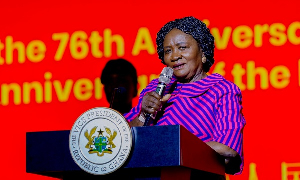As an economic analyst and a follower of the economic trend in Ghana, I have found it expedient to write this article to highlight some salient points which can accelerate the economic progress of the country. After a period of observation, there are four major economic determinants that I think are needed for the economic growth and prosperity of its people. I realize also that several economic statistics such as inflation, interest rate, GDP, GDP per capita e.t.c all interplay into these four major primers and determinants of economic progress. I call them primers because they are needed to jump-start a slumping economy. Also, I call them determinants because they provide a certainty trajectory for the economy besides describing the state of the economy. These four major economic primer determinants are Foreign Direct Investment (DFI), Portfolio investment, Exchange rate stabilization and Unemployment. Direct Foreign Investment encompasses investment in fixed assets including but not limited to setting up of new companies, construction of new plants or its expansion, acquisition of existing companies and mergers as well. Portfolio investment on the other hand involves transactions in long-term assets such as stocks, bonds, Eurobonds. Really, I am optimistic that if the ruling government can enact economic policies that are pioneered towards the improvement of these entities coupled with the existing fiscal and monetary policies, the attainment of a prosperous nation would be inevitable. Until now, the fiscal polices in the form of taxation and spending regulation and the monetary policies meant to control the money supply in the economy appears to be in place and this is remarkable.
Currently, it looks as if the focus of the government of Ghana is an inordinate reduction in inflation or the attainment of good GDP growth figures. Just last week, it was published that inflation was 15.97% in December which presupposes the current government has been able to bring it down presumably from above 20% at the beginning of the year to the current level of about 16%. This is commendable anyway. How be it, good inflation and GDP figures are only indicators of economic growth and sorry to say they are not good measurement for economic prosperity of the people of Ghana. It is not the fine inflation and GDP figures that can bring jobs to the people or improve upon their standard of living. Factually, what is the argument here? GDP is only a quantitative measure of the nation’s total economic activity. This definition suggests a missing qualitative dimension which I believe actually measures the standard of living and reveals the realities of the quality of life.
Economists employ the statistic GDP per capita when they would like to assess the standard of living in a country but this also presents erroneous analysis. GDP per capita by formula is the GDP value divided by the total number of people in a country. The concept here is that the higher the GDP per capita value, the better the standard of living. This is very interesting when one looks at some recent GDP per capita value analysis of 207 countries in the world. In that economic analysis Zimbabwe got a GDP per capita of $382.88 and is ranked 186/207 ahead of nations like Tanzania (GDP per capita $323.93 ,ranked 193/207), Togo (GDP per capita $350.60, ranked 190/207). It’s even more interesting when Haiti (GDP per capita $573.70, ranked 175/207) is ahead of Ghana (GDP per capita $572.77, ranked 176/207). Obviously, it can be deciphered that these statistics do not correlate with the standard of living or the quality of life in the respective countries. Perhaps, using the Gini index which is a quantitative measure of the income distribution of the people in a country could be a better statistic for measurement of the standard of living than GDP per capita. Next, inflation is a quantitative measure of the rate at which the general level of prices for goods and services is rising. It is measured by the Consumer Price Index (CPI) statistic. Inflation greatly impacts the purchasing power of incomes in the country. CPI measurements also have its lapses and consequently inflation is also not a perfect statistic. For your information, a lot of countries are trying to move away from the use of inflation, GDP and GDP per capita as means of assessing the health of their economy because of the inaccuracies associated with these statistics.
Again, I am not against the fact that the current government is trying to control inflation by adjusting its levels of spending, taxation and raising interest rates. As a matter of fact, inflation and GDP growth are good measures as they are reliable sources of information for foreign investors (both fixed income investors and stock investors). Fixed income investors are more interested in inflation as it can help them to know the worth of their money today after discounting their expected future returns by inflation. Stock investors would also factor inflation into their returns on investment in the hope of generating higher rates of return if inflation is low or moderate. Strangely, in spite of all these economic pursuits and jargons, the most important thing to Ghanaians is jobs and not what the GDP growth is or the inflation figures are. To the lame man, this is noise until the fruits are seen and experienced. The high unemployment rate is appalling and something needs to be done about it. Again, much as the government is pursuing fiscal and monetary policies to create a favorable business environment for investors to come, it must also pursue policies that are directed uniquely towards the attraction of more Direct Foreign Investment (DFI) and Portfolio investment which has the propensity to reduce the unemployment rate. Fixed income investors, stock investors are all potential investors for DFI and Portfolio investment respectively in Ghana. Also, it is true that the Ghana Stock Exchange is comparatively not well developed to attract more portfolio investment but the government must come up with policies that would improve its trade status internationally despite the current fiscal and monetary policies in place. For example, government policies should be in place for the crude oil exploration and mining companies in Ghana to start trading in crude oil stocks on Ghana Stock Exchange once oil production begins in 2010. The fact is Gold is traded on the exchange by companies such as AngloGold Ashanti so why not crude oil. All these can help in the elevation of the status of Ghana Stock Exchange internationally.
Another fact about DFI and Portfolio investment is that they would serve as leading indicators for monitoring the growth of the economy of Ghana. As leading indicators, it presupposes that economic growth will be trailing the two entities DFI and Portfolio investment. Which also means changes in them would occur before economy growth changes occur. Consequently, as DFI and Portfolio investments go down it sends a signal that economic downturn or recession is on the way. Likewise, when they go up, it’s a signal that positive economic growth is at the corner. Also, unemployment is a lagging indicator which means it changes sometime after the economy has changed. Again, as a lagging indicator, it trails economic growth and this presupposes that changes in it occurs sometime later after the economy changes. It suggests that when the economy goes down, some time later unemployment would begin to go up. On the other hand, when economy goes up, sometime later unemployment begins to go down. In fact, the time when these things happen may be stochastic as they could be two quarters, one year, some business cycles and so on. In reality, there is a correlation between the leading indicators DFI, Portfolio investment and the lagging indicator unemployment. As DFI, Portfolio investment increases it reflects later in reduce unemployment. Also, I am of the view that the ruling government’s emphasis is on DFI but I am recommending a strong reconsideration of Portfolio investment. Next, in similar economics context, GDP growth and inflation are coincident indicators in that they change as the economy changes. That means as the economy moves up so they do. Remember that as GDP grows there is an attendant increase in prices and that is what causes inflation rate to go up. Also when the economy cools so does GDP goes down. In the second part of this article, I would continue with the policies that are needed and throw more light on portfolio investment and the invigoration of Ghana Stock Exchange.
Source: Charles Horace Ampong
Blog: http://www.charliepee.blogspot.com
Opinions of Wednesday, 20 January 2010
Columnist: Ampong, Charles Horace














